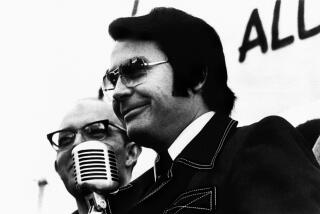The Radio Documentary Is Alive and Well and at Home on KNX-AM
Commercial radio generally shuns documentaries the way television does.
The logic runs this way: If it’s timely, in-depth, thought-wrenching and does not have a “Laverne and Shirley” story line, send it over to the local public station. Documentaries don’t sell soap, Sominex or Chevrolets.
Listeners accustomed to a quick dose of sports, traffic, business, headlines and weather have trouble staying with extensive reports on a single subject, let alone a radio special lasting up to 30 minutes.
So how is it that KNX-AM (1070) has managed to keep the radio documentary alive and well and on the air, even if only one night a month?
In a word: commitment.
“The reality is, if we dropped documentaries, we would probably do better, have more listeners, and our ratings would be a little higher,” says Bob Sims, KNX news director. “What you do is maintain your integrity as an honest, significant, serious news operation by not doing everything for a buck.”
The integrity and significance of KNX as a news organization was given a clear boost recently when the news station earned an Alfred I. duPont-Columbia University Award in Broadcast Journalism, for a year’s worth of 12 investigative/documentary programs under the catchall title of “Assignment, ‘84-’85.” The DuPont, considered the broadcast equivalent of a Pulitzer Prize, was awarded to only two radio stations, KNX and Desert West, of Tucson, Ariz., from among 186 radio program entries.
While KFWB, KNX’s major local rival, produces special series, Sims says, the key competition, as far as he’s concerned, isn’t local.
“The smaller stations run documentaries every once in a while, but National Public Radio and the other networks are the biggest competition. They do longer programs and documentaries. They’re the real competition for us.”
But even the competition has a different attitude about the documentary.
“You very rarely hear someone saying, ‘I want to do a documentary.’ The word is almost out of vogue,” said Jay Kernis, executive producer of National Public Radio’s “Weekend Edition.” “So we are thinking about them differently.”
NPR is one of the few radio organizations that still welcomes the documentaries that air on its flagship news programs “Morning Edition” and “All Things Considered.” KPCC-FM (89.3) and KCRW-FM (89.9) carry NPR locally. NPR “documentaries,” however, are not documentaries in the same sense as KNX-AM’s “Assignment ‘86” efforts. NPR “segments” generally run from 7 to 16 minutes and air periodically.
NPR executive producers register surprise that documentaries in the traditional sense (30 to 60 minutes long), such as those run by KNX, find air time at all on U.S. radio stations.
National Public Radio has worked on building its short documentary-style pieces into its programs over a period of time.
“That’s the way to get listenership for it,” Kernis said. “Secretly, inside, most people in the business would like to see the hour documentary come back and find an audience. But it would be very difficult to promote on public radio stations.”
More to Read
The complete guide to home viewing
Get Screen Gab for everything about the TV shows and streaming movies everyone’s talking about.
You may occasionally receive promotional content from the Los Angeles Times.






